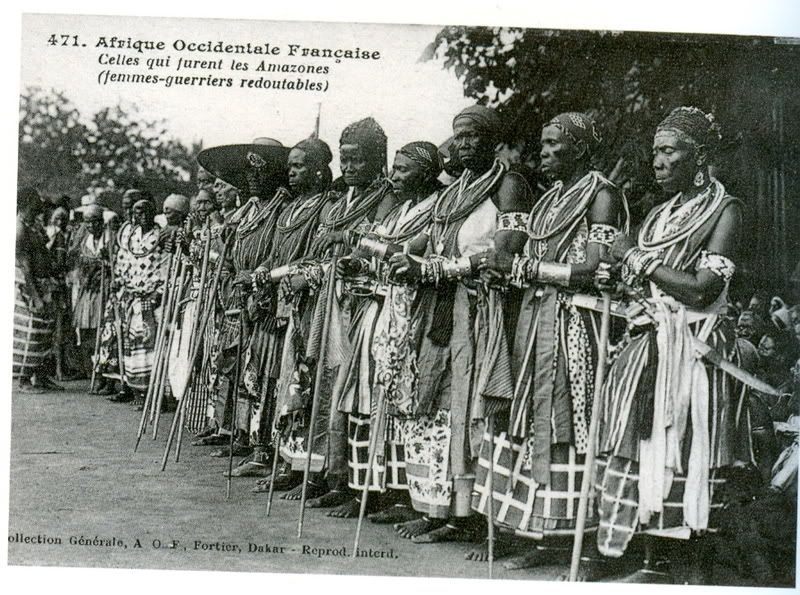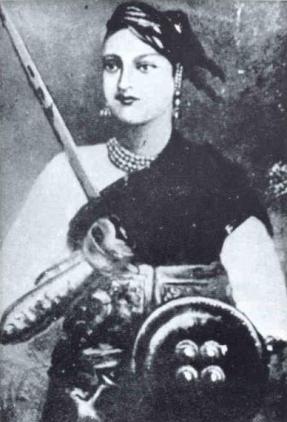
 |
|
|
|
|
#1 |
|
Member
Join Date: Dec 2008
Posts: 70
|
Hello,
After telling my friends wife about my "sword collecting" hobby, and showing her some of my collection, she curiosly asked me a very interesting question (or technically several questions) that after thinking about it I realized I dont know much about. The questions were (paraphrasing): What kinda weapons(edged) could women be allowed and would wield in the past and in what cultures? were there really women assasins and in which cultures what what did they use? I know the questions are broad but I thought if everybody could contribute something it might make for an interesting discussion. Please feel free to include any countries and cultures: China, Japan, Middle-East, Inonesia, India, Europe and others... Any edged weapons (in hand and throwing) and maybe archery?, Any small bits of information are welcome. Happy New Year, Aleksey. |
|
|

|
|
|
#2 |
|
Member
Join Date: Dec 2004
Posts: 1,247
|
I'll take one of the easier ones first: Japan.
Yes, there were a few women warriors (onna bugeisha, or women trained in the use of weapons Tomoe Gozen was one), and samurai wives in general were expected to defend their households. That's one reason why in modern Japan and America, naginata-do is practiced more by girls and women than by men. Women also carried knives to commit suicide with. Supposedly there were female ninja, kunoichi, but I'm not sure how much about them is real, how much is fake, and whether they were assassins, spies, or some combination. I'll also throw in an interesting weapon from Korea: the jang do (link to one at Pitt Rivers). These were small (~10 cm) knives carried by women (and men to a lesser extent) during the Choseon period. Jang do were so highly ornamented that they were also jewelry, worn a variety of ways. Symbolically, they were also given to young women before their weddings, to protect against rape, and also as a symbol that they were now independent from their parents and full adults. My 0.002 cents, F |
|
|

|
|
|
#3 |
|
Member
Join Date: Jan 2006
Location: Kent
Posts: 2,653
|
Hi Aleksey
welcome to the forum  Interesting question, heres a link to a previous thread which may interest you. Interesting question, heres a link to a previous thread which may interest you.http://www.vikingsword.com/vb/showth...hlight=amazons Regards David |
|
|

|
|
|
#4 |
|
Member
Join Date: May 2007
Posts: 93
|
Hi Aleksey, women in Indonesia often carried a small keris known as a patrem for self defence.

|
|
|

|
|
|
#5 |
|
Member
Join Date: May 2006
Posts: 6,893
|
The patrem was probably not a defensive weapon, but rather a ceremonial one, which some women of rank were entitled to wear under certain circumstances.
In old Malaya, and some other localities in S.E. Asia, a very small variety of the lawi ayam or korambit was the usual women's weapon. Sometimes these could be carried in a fold of the clothing, and sometimes secreted in the konde (the bun of hair at the back of the neck). In Central Jawa noble women would also sometimes carry a small, expensively ornamented dagger. Some years ago there used to be a display of these small daggers in the Mangkunegaraan musium in Solo. They were about 8 inches long, in the scabbard, handle of either agate or embossed metal, and scabbard of metal, in most cases this was gold or suasa---probably the reason they seem to have disappeared from display. Thirty years ago in Malang in East Jawa I knew a woman who carried a cock's spur fitted into a small bambu grip. Indonesian fighting cock's spurs are effectively narrow, double edged daggers about three inches long. In Jawa the pins that women used to hold their hair in place, the tusuk konde, also served as weapons, but this use was not unique to women in Jawa, my own grandmother once put a man who attacked her, into hospital, with a hat pin. The pics are of a lawi ayam that was used in an attack on a man around 1920, probably in Singapore; it is 6" overall in the scabbard, and 5.5" out of the scabbard. |
|
|

|
|
|
#6 |
|
Member
Join Date: Mar 2005
Location: USA Georgia
Posts: 1,599
|
Hi Aleks,
Well, you have seen what Anne has in her kitchen gallery! From Germany, to Papua New Guinea, with an emphasis in Africa, Philippines and Java. And an Arab Camel rifle.... Glad to see you posting here!!! |
|
|

|
|
|
#7 |
|
Member
Join Date: Jan 2008
Posts: 1,430
|
Hi
Apart from the famous Amazons of Dahomey, I have heard of one other instance of women historically carrying edged weapons. In Chris Peers' book "Armies of the 19th century : East Africa", he mentions a report by H.M. Stanley regarding the Buganda King Mtesa having a contingent of female warriors in the mid 1870s. About half were armed with guns and the rest with spears. He also mentions some women fighters carrying mysterious "striped staffs"... |
|
|

|
|
|
#8 |
|
Member
Join Date: Dec 2004
Location: Sint-Amandsberg (near Ghent, Belgium)
Posts: 830
|
Here are the Amazons of Dahomey. Fierce looking creatures !
 
|
|
|

|
|
|
#9 |
|
Member
Join Date: Dec 2004
Location: B.C. Canada
Posts: 473
|
Well the question was wielding weapons. It may not always have been for war or violence. Other reasons were ceremony, art, dancing or the erotic. Here is a post card from Algeria.
Jeff |
|
|

|
|
|
#10 | |
|
Member
Join Date: Oct 2008
Location: Manila, Phils.
Posts: 1,042
|
Quote:
I wonder what the message of the symbolisms are -- we have a young lady who seems to be lactating mother, and who is either pregnant again or had just delivered one, and then she's holding that ceremonial sword. Moving to another location, here's an account describing an Igorot "amazon priestess": "On the 25th [June 1747], Don Cuarto began the attack, but was soon put out of action himself by two rocks which struck him in the head. Apparently directing the defense forces was a sort of amazon priestess in their midst, naked to the waist, who kept inciting the Ipituys to fever pitch with her shouts and taunting the enemy with her invective and challenging them to shoot her, and although she was a frequent target, no ball found its mark -- a circumstance analyzed in the friar report of the battle as a sure sign of direct covenant with the Devil. The Igorots fought with such fury and war cries they literally foamed at the mouth, causing their enemies to suspect they had chewed some narcotic root to provide a suicidal intoxication."The account was taken from WH Scott's The Discovery of the Igorots: Spanish Contacts with the Pagans of Northern Luzon (1974). |
|
|
|

|
|
|
#11 | |
|
Member
Join Date: Dec 2004
Location: B.C. Canada
Posts: 473
|
Quote:
I think it was meant to symbolize what it says, 'The saber dance' . I think her physic is only what is/was thought to be erotic. This is one more answer for the original question asked; "What kinda weapons(edged) could women be allowed and would wield in the past and in what cultures?" All the best. Jeff |
|
|
|

|
|
|
#12 | |
|
Member
Join Date: Oct 2008
Location: Manila, Phils.
Posts: 1,042
|
Quote:
 Before I posted that earlier comment of mine, I was reading this earlier post, which said: "In some tribes of Africa, smiths are outcasts that live outside the village. They are uncircumcised, therefore they posses both the masculine and the feminine, symbolically having the entirety which confers them, as in the Congo culture, the necessary protection to work iron, a product of Mother Earth's womb extraction."And then I saw the pic you posted. So for a moment, it crossed my mind that perhaps the photographer was constructing a metaphor. Something like this and please hold on tight!  -- --Mother Earth's womb and breast can yield both nourishment and destruction (or raw materials therefor ... e.g., metal ore which can be made into a scalpel or a sword, etc.). Now the lactating and/or pregnant girl in the photo symbolizes the thought, and the ceremonial sword sort of provides the link to the parallelism. Then again I may be reading too much between the lines. Or perhaps it's the effect of the new herbal tea somebody gave me last Christmas?   Ok, I think too it's both! 
|
|
|
|

|
|
|
#13 |
|
Member
Join Date: Dec 2004
Location: B.C. Canada
Posts: 473
|
Hi migueldiaz,
Thats the beauty of interpretation one is just as valid as another. Now were can I get some of that tea  . Jeff . Jeff
|
|
|

|
|
|
#14 | |
|
Member
Join Date: Sep 2008
Location: PR, USA
Posts: 679
|
Alternatively, she may 1. suffer from intestinal worms which have distended her peritoneum and bowels, 2. is fat, which was considered attractive in North Africa, and/or 3. the saber represents the surgical blade used to make partum episiotomies...
 Quote:
|
|
|
|

|
|
|
#15 | |
|
Member
Join Date: Sep 2008
Location: PR, USA
Posts: 679
|
I have shot the Spanish M 1752 fusil, very similar to the M 1728, and it is reasonably accurate and reliable.
Most probably they didn't even shoot at her, the spanish are inured from birth to women shouting abuse at us, throwing dishes etc...It's almost a church-sanctioned way of showing affection... I still remember the beating I got in Galicia when I was 10 yrs. old, from a 11 yo blonde, blue eyed celtic she-devil, just out of a whim... In WWII, a couple of my grand-uncles served in the Wehrmacht in Russia. They were supplied methamphetamine-laced chocolate while at the frontline, which made them alert, aggressive and "roaring to go"... M Quote:
|
|
|
|

|
|
|
#16 |
|
Member
Join Date: Oct 2007
Posts: 2,818
|
I couldn't help but raise this ole thread again after reading these links this morning;
http://en.wikipedia.org/wiki/Tomyris http://en.wikipedia.org/wiki/Nine_Wo...emale_Worthies Enjoy the read. Gav |
|
|

|
|
|
#17 |
|
Member
Join Date: Aug 2006
Posts: 608
|
Long live the necroposter!
 Thanks for dredging the forum to find this one, Gav... The thread might be two and a half years old, but it's new to me. Thanks for dredging the forum to find this one, Gav... The thread might be two and a half years old, but it's new to me.  Anyway, as I didn't see this she-biscuit mentioned elsewhere in the thread, here is my wife's own "historical heroine," if you will, Jhansi Ki Rani: 
|
|
|

|
 |
|
|